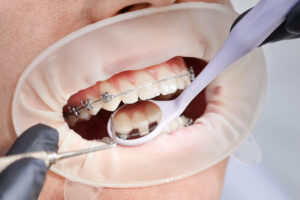Braces for adults are no longer unusual. More people in their 30s, 40s, and even 60s are choosing to straighten their teeth. They want better smiles, stronger bites, and healthier mouths. Some skipped braces as teens, while others saw their teeth shift over time. Modern options now make it easier and more comfortable for adults to get started.
Why Adults Choose Braces
 People decide to get braces for different reasons. Some missed out on orthodontic treatment when they were younger. Others had braces in their teens but didn’t wear their retainers, leading to shifting teeth. Many just want to improve their smile and feel more confident at work or in social situations.
People decide to get braces for different reasons. Some missed out on orthodontic treatment when they were younger. Others had braces in their teens but didn’t wear their retainers, leading to shifting teeth. Many just want to improve their smile and feel more confident at work or in social situations.
Straightening your teeth isn’t just about appearance. Misaligned teeth can cause jaw pain, uneven wear, speech problems, and even gum disease. Braces can help correct these issues and make it easier to maintain oral hygiene.
Common Orthodontic Problems in Adults
Crowded Teeth
Crowded teeth overlap or twist due to limited space in the jaw. This makes it harder to brush and floss effectively, which increases the risk of plaque buildup, cavities, and gum disease. It can also lead to uneven tooth wear and jaw strain over time. Orthodontic treatments like braces or clear aligners create proper spacing, improving both oral hygiene and bite function.
Overbite or Underbite
An overbite occurs when the upper front teeth excessively overlap the lower front teeth, while an underbite means the lower teeth extend past the upper ones. Both conditions can cause difficulty in chewing, speech impediments, and long-term jaw discomfort or TMJ disorders. Orthodontic care realigns the teeth and jaw to distribute bite forces evenly and reduce stress on the jaw joints.
Gaps Between Teeth
Spaces between teeth, also known as diastemas, may occur naturally or due to missing teeth or tongue thrusting. These gaps can trap food and make the gums more vulnerable to inflammation or infection. They can also impact speech clarity. Orthodontic treatment closes the gaps, improving bite balance and giving the smile a more uniform appearance.
Shifting Teeth
Teeth can shift throughout adulthood due to aging, tooth loss, periodontal issues, or failure to wear a retainer after past orthodontic treatment. This can cause crowding, bite misalignment, or changes in facial structure. Adult braces or aligners correct these shifts, restoring alignment and preventing further dental complications.
You Have More Options Than Ever

Orthodontic technology has come a long way. Adults now have choices that fit their lifestyle and comfort level.
Metal Braces
Today’s metal braces are smaller and more comfortable than before. They remain a reliable option for people with moderate to severe alignment problems.
Clear Braces
Clear ceramic braces work like metal braces but blend in with your teeth. They’re popular among adults who want something less visible.
Clear Aligners
Clear aligners like Invisalign use custom trays to move teeth gradually. They’re removable, discreet, and easy to clean. Many adults prefer them for convenience.
Lingual Braces
Lingual braces sit behind the teeth, hidden from view. They’re effective but may take time to get used to.
Adult Treatment May Take a Bit Longer
Bone density increases with age, so moving teeth may take more time. While teens often finish treatment in 12 to 18 months, adults may need 18 to 30 months, depending on their case. Still, the results are worth the wait.
Benefits Go Beyond the Smile
Straight teeth help more than just your appearance. Adults who get braces often notice improvements in many areas of life.
Better Oral Health
Aligned teeth are easier to clean. This lowers the chance of plaque buildup, cavities, and gum disease.
Improved Jaw Function
Correcting bite problems helps reduce jaw pain and muscle strain. It also helps prevent grinding and clenching.
Boosted Confidence
Many adults say they smile more after treatment. This helps them feel better in job interviews, meetings, and social events.
Better Long-Term Dental Outcomes
Straight teeth lower the risk of dental problems later in life. You may avoid costly procedures by fixing alignment issues early.
Orthodontists Understand Adult Needs

Orthodontists now see a growing number of adult patients. They know adults care about appearance, comfort, and time. Clinics often offer flexible appointment schedules and payment plans to make treatment easier to manage.
Braces at Any Age: What to Expect
Consultation
The orthodontist will examine your teeth and take X-rays or digital scans. They’ll talk about your goals and recommend a treatment plan.
Treatment Plan
You’ll learn how long treatment will take and what options fit your case. The plan may include braces, aligners, or other appliances.
Follow-Up Visits
You’ll have check-ins every few weeks. The orthodontist will track progress and make adjustments when needed.
Retainers After Braces for Adults
Once your teeth are in place, you’ll wear a retainer to keep them from shifting again. Most people wear them at night.
It’s Not Just Cosmetic
People often think braces are just for looks. But untreated bite and alignment problems can lead to long-term issues, including:
-
Difficulty chewing
-
Speech trouble
-
Tooth grinding
-
TMJ disorders
-
Gum recession and bone loss
Correcting these problems can make everyday life more comfortable and help preserve your teeth.
Adult Braces Are Worth It
Choosing braces for adults takes commitment, but the payoff is lasting. You’ll enjoy a smile you feel proud of, better oral health, and lower chances of future dental issues. Age doesn’t matter. What matters is taking the first step.
Ready to Start? We Can Help
Smiles by Lorino offers adult orthodontic care in Franklin Lakes, Long Hill, Belleville, and Wayne. We provide metal braces, clear braces, and Invisalign for adults. We’ll guide you through every step and help you choose what works best for you. Call us today to schedule a consultation.
Frequently Asked Questions
Am I too old to get braces?
No. There’s no age limit for braces. Adults of all ages can benefit from treatment.
Will it take longer than it does for kids?
In some cases, yes. Adult teeth move a bit slower because the jaw is no longer growing. But many people still finish treatment in under two years.
Are clear aligners as effective as braces?
Yes, for mild to moderate issues. Severe bite or alignment problems may need braces. Your orthodontist will recommend what works best for you.
Do adult braces hurt?
You may feel pressure after adjustments or when switching to a new aligner. This goes away in a few days and is manageable with over-the-counter pain relief.
Can I still eat my favorite foods?
Yes, but you’ll need to avoid sticky or hard foods if you have braces. Clear aligners are removable, so you can eat normally after taking them out.

